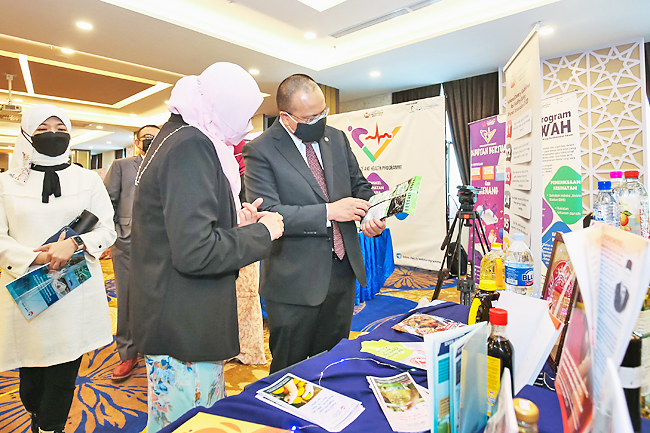James Kon
Tackling non-communicable diseases (NCDs) – such as cancer, heart disease (including stroke), diabetes and chronic respiratory diseases – is one of the challenges that remain a major problem globally. Brunei Darussalam is no exception, with nearly 85 per cent of deaths among adults being tied to NCD sufferers.
Minister of Health cum guest of honour Dato Seri Setia Dr Haji Mohd Isham bin Haji Jaafar highlighted this at the launching of Brunei Darussalam Multisectoral Action Plan for the prevention and control of Noncommunicable Diseases (Bru-MAP-NCD) 2021-2025 at Yayasan Sultan Haji Hassanal Bolkiah Complex yesterday.
When the COVID-19 pandemic struck, studies showed that individuals with NCD-associated comorbidities were the ones prone to health complications, with a higher death risk.
Risk factors such as being overweight or obese have been shown to be closely associated with the severe effects of COVID-19.
These findings were also in line with that found in the Sultanate, where COVID-19 patients in categories 4 and 5 were those with risk factors or suffering from various types of NCDs.

“When the country started implementing control measures to curb the spread of the pandemic – such as practicing physical distance and undergoing quarantine orders – various issues arose, experienced by all, in terms of health behaviour changes, stress due to the restrictions, economy uncertainty and so on.
“In terms of health behaviour changes, the control and management of NCD were affected. The difficulty in acquiring healthy food and access to preventive services or health promotion caused more people to consume less healthy food, not engage in physical activities and to use tobacco,” he said.
The pandemic also affected the health services for NCD patients in Brunei Darussalam.
The postponement of appointments and routine medical test slowed down patient management; while physical distancing, limited access to health centres as well as clinic, pharmacy and community services; in addition to reduction of transportation networks, contributed to the drop in the effectiveness of healthcare for NCD patients.
With the control and prevention of NCD being a dominant health challenge in the 21st Century for the world, Dato Seri Setia Dr Haji Mohd Isham said, “The treatment cost for NCD patients is extremely high, not only to the patient, but also the expenditure of the country as well as to the health system, and the global economy.
“Therefore, the response to the prevention and control of NCD requires integrated measures from all levels, especially from the aspects of policy, health system, community action in Brunei Darussalam and each individual behaviour.”



















































